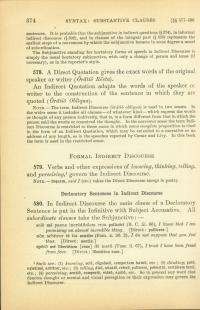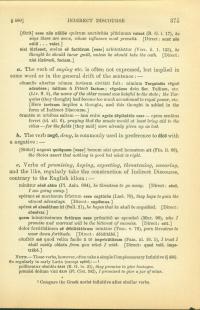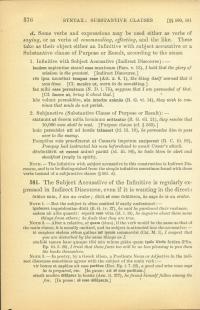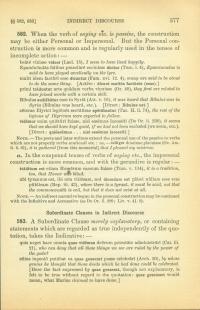580. In indirect discourse the main clause of a declaratory sentence is put in the infinitive with subject accusative. All subordinate clauses take the subjunctive.
Sciō mē paene incrēdibilem rem pollicērī. (B. C. 3.86)
I know that I am promising an almost incredible thing.
[Direct: polliceor]
Nōn arbitror tē ita sentīre. (Fam. 10.26.2)
I do not suppose that you feel thus.
[Direct: sentīs]
Spērō mē līberātum [esse] dē metū (Tusc. 2.67)
I trust I have been freed from fear.
[Direct: līberātus sum]
[Dīcit] esse nōn nūllōs quōrum auctōritās plūrimum valeat (B. G. 1.17)
He says there are some, whose influence most prevails.
[Direct: sunt nōn nūllī . . . valet]
Nisi iūrāsset, scelus sē factūrum. [esse] arbitrābātur (Verr. 2.1.123)
He thought he should incur guilt, unless he should take the oath.
[Direct: nisi iūrāverō, faciam]
a. The verb of saying, etc., is often not expressed, but implied in some word or in the general drift of the sentence.
Cōnsulis alterīus nōmen invīsum cīvitātī fuit: nimium Tarquiniōs rēgnō adsuēsse; initium ā Prīscō factum; rēgnāsse dein Ser. Tullium, etc. (Liv. 2.2)
The name of the other consul was hateful to the state; the Tarquins (they thought) had become too much accustomed to royal power, etc.
[Here invīsum implies a thought, and this thought is added in the form of indirect discourse.]
ōrantēs ut urbibus saltem—iam enim agrōs dēplōrātōs esse—opem senātus ferret (id. 41.6)
praying that the senate would at least bring aid to the cities—for the fields [they said] were already given up as lost.
b. The verb negō (deny) is commonly used in preference to dīcō with a negative.
[Stōicī] negant quidquam [esse] bonum nisi quod honestum sit. (Fin. 2.68)
[The Stoics] assert that nothing is good but what is right.
c. Verbs of promising, hoping, expecting, threatening, swearing, and the like, regularly take the construction of indirect discourse, contrary to the English idiom.
Minātur sēsē abīre. (Pl. Asin. 604)
He threatens to go away.
[Direct: abeō I am going away.]
Spērant sē maximum frūctum esse captūrōs (Lael. 79)
They hope to gain the utmost advantage.
[Direct: capiēmus]
Spērat sē absolūtum īrī. (Sull. 21)
He hopes that he shall be acquitted.
[Direct: absolvar]
quem inimīcissimum futūrum esse prōmittō ac spondeō (Mur. 90)
who I promise and warrant will be the bitterest of enemies
[Direct: erit]
Dolor fortitūdinem sē dēbilitātūrum minātur. (Tusc. 5.76)
Pain threatens to wear down fortitude.
[Direct: dēbilitābō]
Cōnfīdō mē quod velim facile ā tē impetrātūrum. (Fam. 11.16.1)
I trust I shall easily obtain from you what I wish.
[Direct: quod volō, impetrābō]
Note— These verbs, however, often take a simple complementary infinitive (§ 456) So regularly in early Latin (except spērō).1
Pollicentur obsidēs dare. (B. G. 4.21)
They promise to give hostages.
Prōmīsī dōlium vīnī dare. (Pl. Cist. 542)
I promised to give a jar of wine.
d. Some verbs and expressions may be used either as verbs of saying, or as verbs of commanding, effecting, and the like. These take as their object either an infinitive with subject accusative or a substantive clause of purpose or result, according to the sense.
- Infinitive with subject accusative (indirect discourse).
Laudem sapientiae statuō esse maximam. (Fam. 5.13)
I hold that the glory of wisdom is the greatest.
[indirect discourse]Rēs ipsa monēbat tempus esse. (Att. 10.8.1)
The thing itself warned that it was time.
[cf. monēre ut warn to do something]fac mihi esse persuāsum (N. D. 1.75)
suppose that I am persuaded of that
[cf. facere ut bring it about that]Hōc volunt persuādēre, nōn interīre animās. (B. G. 6.14)
They wish to convince that souls do not perish. - Subjunctive (substantive clause of purpose or result).
Statuunt ut decem mīlia hominum mittantur. (B. G. 7.21)
They resolve that 10,000 men shall be sent.
[Purpose clause (cf. § 563)]Huic persuādet utī ad hostīs trānseat. (id. 3.18)
He persuades him to pass over to the enemy.Pompêius suīs praedīxerat ut Caesaris impetum exciperent. (B. C. 3.92)
Pompey had instructed his men beforehand to await Cæsar's attack.Dēnūntiāvit ut essent animō parātī. (id. 3.86)
He bade them be alert and steadfast.
(ready in spirit)Note— The infinitive with subject accusative in this construction is indirect discourse, and is to be distinguished from the simple infinitive sometimes found with these verbs instead of a subjunctive clause (§ 563.d).
581. The subject accusative of the infinitive is regularly expressed in indirect discourse, even if it is wanting in the direct.
Ōrātor sum
I am an orator
Dīcit sē esse ōrātōrem
He says he is an orator.
Note 1— But the subject is often omitted if easily understood.
Īgnōscere imprūdentiae dīxit (B. G. 4.27)
He said he pardoned their rashness.
Eadem ab aliīs quaerit: reperit esse vēra. (id. 1.18)
He inquires about these same things from others; he finds that they are true.
Note 2— After a relative, or quam (than), if the verb would be the same as that of the main clause, it is usually omitted, and its subject is attracted into the accusative.
Tē suspicor eīsdem rēbus quibus mē ipsum commovērī. (Cat. M. 1)
I suspect that you are disturbed by the same things as I.
Cōnfīdō tamen haec quoque tibi nōn minus grāta quam ipsōs librōs futūra. (Plin. Ep. 3.5.20)
I trust that these facts too will be no less pleasing to you than the books themselves.
Note 3— In poetry, by a Greek idiom, a predicate noun or adjective in the indirect discourse sometimes agrees with the subject of the main verb.
Vir bonus et sapiēns ait esse parātus, etc. (Hor. Ep. 1.7.22)
A good and wise man says he is prepared, etc.
[In prose: ait sē esse parātum]
Sēnsit mediōs dēlāpsus in hostīs. (Aen. 2.377)
He found himself fallen among the foe.
[In prose: sē esse dēlāpsum]
582. When the verb of saying, etc., is passive, the construction may be either personal or impersonal. But, the personal construction is more common and is regularly used in the tenses of incomplete action.
Beātē vīxisse videor. (Lael. 15)
I seem to have lived happily.
Epamīnōndās fidibus praeclārē cecinisse dīcitur. (Tusc. 1.4)
Epaminondas is said to have played excellently on the lyre.
Multī idem factūrī esse dīcuntur. (Fam. 16.12.4)
Many are said to be about to do the same thing.
[Active: dīcunt multōs factūrōs (esse)]
Prīmī trāduntur arte quādam verba vīnxisse. (Or. 40)
They first are related to have joined words with a certain skill.
Bibulus audiēbātur esse in Syriā. (Att. 5.18)
It was heard that Bibulus was in Syria.
(Bibulus was heard, etc.)
[Direct: Bibulus est]
Cēterae Illyricī legiōnēs secūtūrae spērābantur. (Tac. H. 2.74)
The rest of the legions of Illyricum were expected to follow.
Vidēmur enim quiētūrī fuisse, nisi essēmus lacessītī. (De Or. 2.230)
It seems that we should have kept quiet, if we had not been molested.
(we seem, etc.)
[Direct: quiēssēmus . . . nisi essēmus lacessītī]
Note— The poets and later writers extend the personal use of the passive to verbs which are not properly verba sentiendī, etc.
Colligor dominae placuisse. (Ov. Am. 2.6.61)
It is gathered [from this memorial] that I pleased my mistress.
a. In the compound tenses of verbs of saying, etc., the impersonal construction is more common, and with the gerundive is regular.
Trāditum est etiam Homērum caecum fuisse. (Tusc. 5.114)
It is a tradition, too, that Homer was blind.
Ubi tyrannus est, ibi nōn vitiōsam, sed dīcendum est plānē nūllam esse rem pūblicam. (Rep. 3.43)
Where there is a tyrant, it must be said, not that the commonwealth is evil, but that it does not exist at all.
Note— An indirect narrative begun in the personal construction may be continued with the infinitive and accusative (as De Or. 2.299; Liv. 5.41.9).




